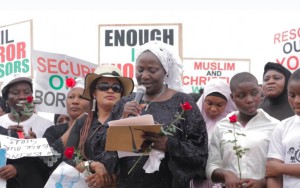.. WOMEN’S EQUALITY ..
an article by Niwano Peace Foundation
The 32nd Niwano Peace Prize is awarded to Mrs. Esther Abimiku Ibanga of Nigeria, a pastor and an activist. She founded “Women Without Walls Initiative” in March 2010, born out of the desperation to put an end to the violent and senseless killings of women and children in Plateau state Nigeria. Since inception, the organization has become a strong coalition of women groups across religious and ethnic divides. From this platform, women have been placed at an advantageous position of raising their voices in the calls for peace in the troubled regions of Nigeria.

Wowwi has brought to the fore the power of women’s voices and created an opportunity for an organised platform for women to play an active role in peace building. It is on record that Women Without Walls Initiative is the first organization to have on its membership all the tribal women leaders, including Christian and Muslim women leaders. These women act as entry points into the various communities in her city particularly in reaching the youths and all community stakeholders. A courageous and dedicated religious leader, Esther has worked extensively to foster and facilitate reconciliation between conflicting religious and tribal groups.
The presentation ceremony will take place in Tokyo, Japan, on Thursday, May 14th, at 10:30 a.m. In addition to an award certificate, Mrs. Ibanga will receive a medal and twenty million yen.
To avoid undue emphasis on any particular religion or region, every year the Peace Foundation solicits nominations from people of recognized intellectual and religious stature around the world. In the nomination process, some 600 people and organizations, representing 125 countries and many religions, are asked to propose candidates. Nominations are rigorously screened by the Niwano Peace Prize International Selection Committee, which was set up in May of 2003 on the occasion of the 20th Anniversary of the Niwano Peace Prize. The Committee presently consists of eleven religious leaders from various parts of the world, all of whom are involved in movements for peace and inter-religious cooperation.
Here are some comments by members of the committee on the selection of Esther Ibanga for this year’s award:
– A courageous and dedicated religious leader who has worked extensively on fostering co-operation and understanding amongst religious groups. Takes a firm and decisive stand regarding the empowerment of women and has been vocal on the Boko Haram kidnappings.(by N. Walaza)
A female pastor and activist, Esther Ibanga works tirelessly calling government and decision makers to address women issues. Like in most conflicts in Africa women and children are the ones who suffer most the consequences of conflict. Pastor Esther Iyaku Ibanga’s work focuses mainly on promoting and harnessing women’s potential as peace makers. As mothers, women are the first educators of human kind because education starts at home. Her recent strong stand against the kidnapping of school girls by Boko Haram is to be commended.(by S.Mbacke)
Can the women of Africa lead the continent to peace?
This question pertains to the following articles:
South Sudanese women take the lead in local peace building
Women take ownership of Great Lakes peace efforts
Les Femmes de Mali S'engagent pour la Paix
The Women of Mali Engage for Peace
Meet the Tanzanian Woman Who Said No to a Forced Marriage
International Women´s Day: Interview With Leymah Gbowee (Liberia)
Announcing: Women of Congo Speak Out!
Samba-Panza’s election represents a bright future for African women in politics
Nobel Women wrap up delegation to eastern Congo
Towards the creation of a network of women for a culture of peace in Africa
Meet Carine Novi Safari, Democratic Republic of Congo
Esther Abimiku Ibanga, Founder and president of The Women Without Walls Initiative to receive the Niwano Peace Prize
African Women's Journal: African Women in Power/Politics